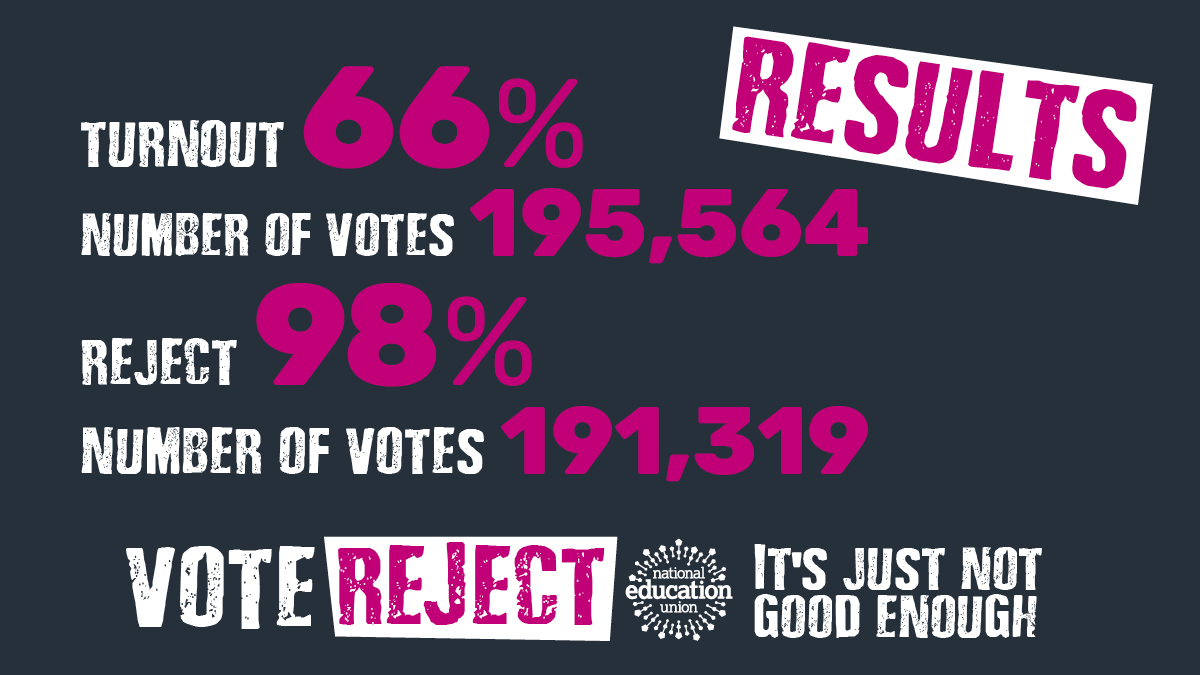NEU teachers reject government’s offer and escalate strike action
The overwhelming rejection of the Secretary of State’s offer by the members of the National Education Union (NEU) shows the strength of feeling among members. 66% of the almost 300,000 members eligible to vote responded to the email ballot, with 98% voting to reject the government’s offer.
This is an amazing result. The union now is larger than in September 2022, when the original ballot was carried out, but today’s results show a 66% response, whereas the previous ballot only had a 62% response. This time the vote against the offer was 98% but in the earlier ballot only 90% voted to support the strike action. Clearly the mood of teachers has hardened significantly since the first vote.

The immediate outcome of this is that there will be two further days of strike action: 27 April 2 and 2 May. Adding to this, NEU Conference today passed a motion to increase this to 5 days. This clearly reflects a more combative mood amongst the NEU teachers. This will doubtless be reflected in more picket lines on those strike days as the confidence and self-activity of the school NEU groups has grown over the strikes. In many districts of the NEU strike committees have been established, meeting regularly to talk through ways to extend the action, to support each other and to publicise our actions.
This action by NEU teachers is not only about pay, but also about raising the level of funding for the education sector as well as the conditions we are asked to work under. The majority of teachers are working a 60+ hour week which leaves little time for families or socialising. The government’s proposal of trying to reduce this by 5 hours a week sometime in the future will not really change much for teachers and shows just how out of touch with the education system they really are.
The intransigence of the government in the face of the biggest funding crisis the education sector has faced is forcing the headteacher unions to seriously consider their positions. Today, the Association of School and College Leaders (ASCL), a union mainly for secondary head teachers, announced the results of their consultation with their members. 56% of their members voted and 87% voted to reject the Government’s pay offer. This is an amazing result for the ASCL and shows that the NEU position is not an isolated stand from a dogmatic group but has the support of the majority of teachers. Other teacher unions, such as the National Association of Schoolteachers/Union of Women Teachers (NAS/UWT) and the National Association of Headteachers (NAHT) will announce the results of their consultations later this week. The expectation is that the NAHT, made up mainly of primary school headteachers, will also vote to reject the pay offer. The vote in the NAS/UWT is less certain.
Education funding crisis fuels teachers’ campaign for better pay and conditions
Clearly, this is not just a campaign for a better pay settlement, important as that may be. What is pushing the NEU and the Headteacher unions is the failure of the government to respond to the funding needs of schools and colleges. Already some schools and colleges have been looking at making teacher assistants (TAs), and in some cases teachers, redundant because they cannot balance their finances in any other way.
In the projections from many local authorities about the next financial year many schools are already facing a deficit. They have no more reserves to draw upon. Although the Government has slightly increased the education budget, forcing schools and colleges to pay for the majority of last year’s pay award and declaring their intention of making schools pay for any award this year, will push many more schools into setting deficit budgets.
In some areas, the expectation is that 40% of schools will be producing deficit budgets. This is an unsustainable position for schools and colleges, as well as Local Authorities. The only way out of this crisis is for education workers to force a serious increase in the education budget and fully funded pay awards.
In schools and colleges, this combative mood amongst teachers will also have an effect on the support staff – the lowest paid section of the education workforce. Already schools and colleges are finding great difficulties in recruiting such staff. Many are leaving for better paid jobs in local supermarkets etc. One effect of this is that many students with special needs do not get the support they should have in lessons.
Traditionally the support staff have been represented by the GMB and Unison but a large proportion of support staff are not unionised as they feel that these unions do not do much to support them. Without any recruitment campaign, tens of thousands of support staff have joined the NEU with the expectation that the NEU will actively represent them.
The decisions of the University and College Union (UCU), the Junior doctors and the PCS to also continue their strikes allows for the possibility of co-ordination at a national and regional level as well as the possibility of joint activity locally. This could lay the basis for local campaigns to defend the public services.
Art Book Review Books Campism Capitalism China Climate Emergency Conservative Government Conservative Party COVID-19 Creeping Fascism Economics EcoSocialism Elections Europe Far-Right Fascism Film Film Review Fourth International France Gaza History Imperialism Iran Israel Italy Keir Starmer Labour Party Long Read Marxism Marxist Theory Migrants Palestine pandemic Police Protest Russia Solidarity Statement Trade Unionism Trans*Mission Ukraine United States of America War

